NRICH has been invited to lead six face-to-face PD days for primary teachers in the London Borough of Tower Hamlets over the academic year 2016-17, focusing on Leadership for Learning in mathematics. Two teachers from each of 16 primary schools will come together on each day with two members of the NRICH primary team to explore ways of assessing the three aims of the primary mathematics
curriculum and to consider how best to support their colleagues in developing appropriate strategies for problem solving, reasoning and fluency in their classrooms and assessment of the progression of these skills.
Each session will offer opportunities to explore the role of NRICH tasks in nurturing confident, resourceful and enthusiastic teachers and learners of mathematics, and gap tasks will encourage the development and embedding of these ideas in their schools throughout the year.
This page summarises the content and discussions during each day. If you would like anything uploading to this page, or have any queries about the project, please contact the NRICH primary team.
Day 1: Wednesday 04 October 2017
Here is a pdf of the PowerPoint slides we used on the day: 20171004TH Day 1.pdf
The tasks were:
First Product Sudoku
Four Triangles Puzzle
Magic Vs
The tasks were:
Sandwiches
Which Scripts?
Reach 100
Day 3: Tuesday 9th January 2018
Here is a pdf of the PowerPoint slides we used on the day: 20180109 TH Day 3.pdf
The tasks were:
Reach 100
Which Scripts?
Maths Story Time
Poly Plug Rectangles
Day 4: Tuesday 6th March 2018
Here is a pdf of the PowerPoint slides we used on the day: 20180306THDay4.pdf
The tasks were:
Using Books: The Doorbell Rang
Rectangle Tangle
Robot Monsters
Sealed Solution
Square Subtraction
Odd Times Even
Guess the Dominoes
Play to 37
Here are photos of some children's reasoning, the first relates to Poly Plug Rectangles and the second to Fifteen Cards:
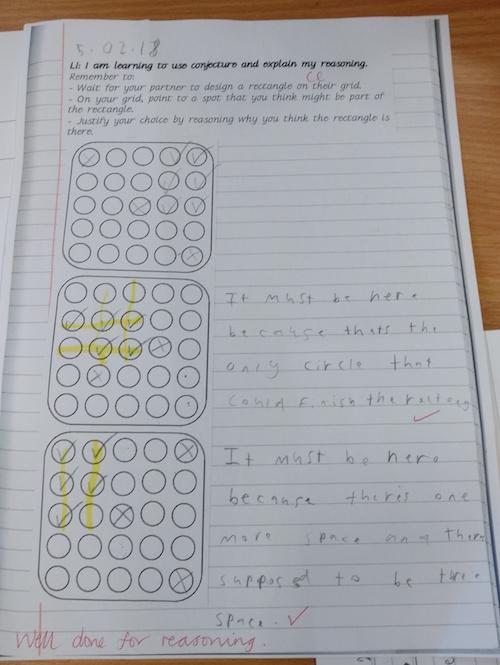
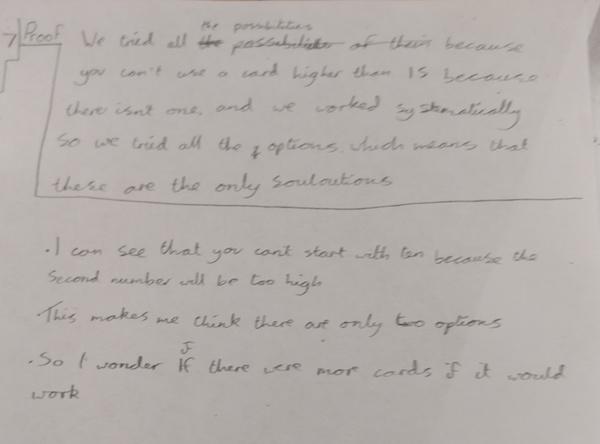
This photo shows a display all about Poly Plug Rectangles:

Here are notes made about how one class got on with the task:

The photos below show developing reasoning rubrics:
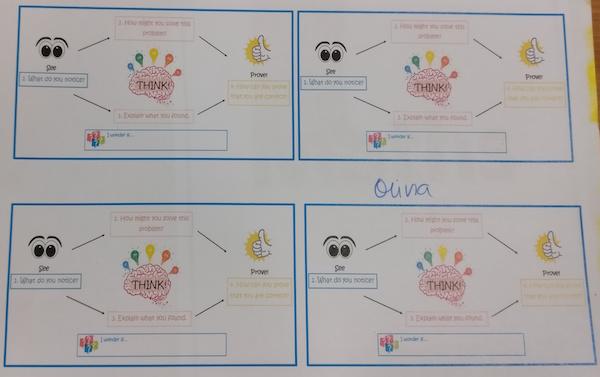
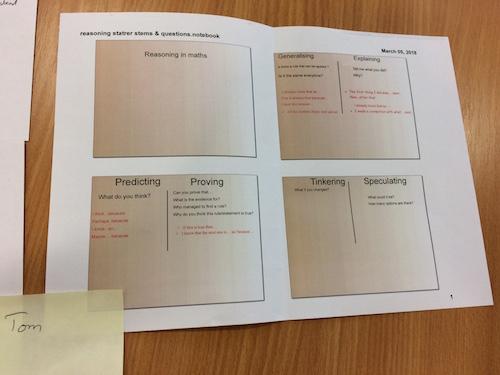
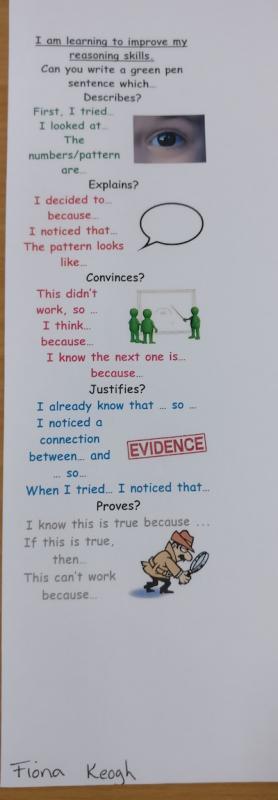
Here is one example of rubric which takes into account the five stages of reasoning, with question prompts for adults and sentence starters for children:
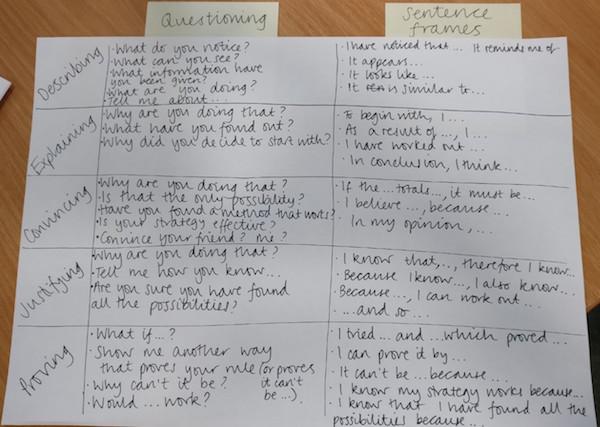
Please refer to the Teacher Takeaway slide in the PDF for a reminder of the gap tasks from Day 4 to prepare for Day 5.
Day 5: Wednesday 18 April 2018
Here is a pdf of the PowerPoint slides we used on the day: 20180418THDay5.pdf
The NRICH tasks were:
Number Match
Fraction Match
Factors and Multiples Game
Square Surprise and Seeing Squares
Estimating Angles
Board Block
Cops and Robbers
Guess the Houses
Here are downloadable sheets containing numberless protractors which Fran mentioned on the day: 180-degree.docx and 360-degree.docx
We also worked on some of the tasks featured in the article Fluency without Fear, available from youcubed.org.
We shared experiences of working on reasoning tasks since last time. Here are two photos showing Reception children working on the Robot Monsters task:
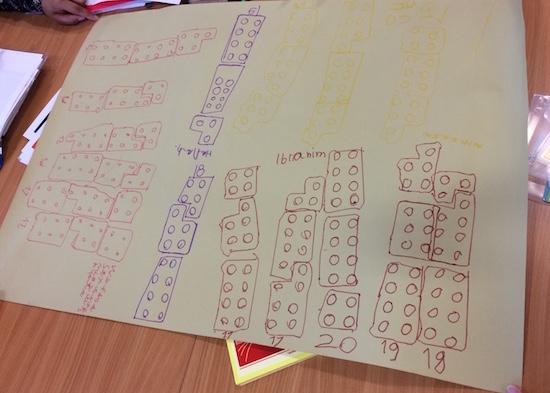
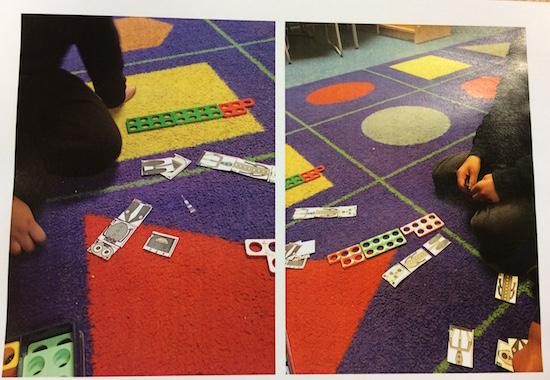
Below are two examples of children's recording as they worked on Heads and Feet:
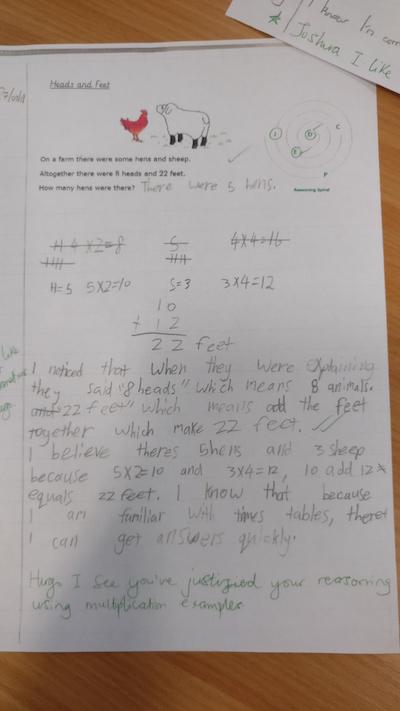
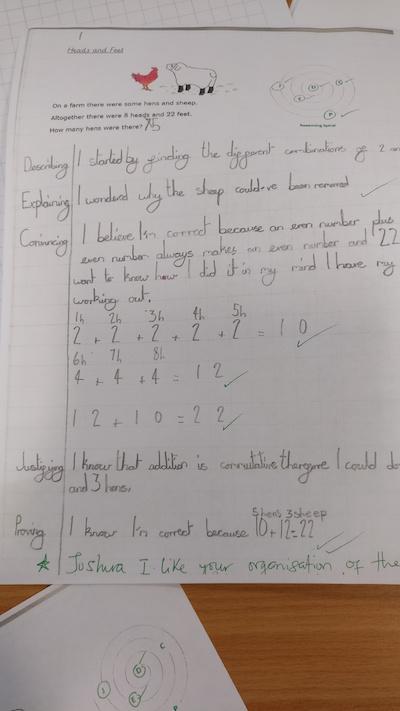
Here are some children's work on the problem Sealed Solution:
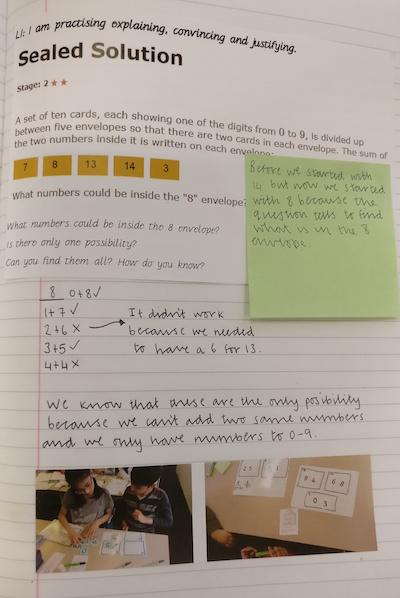
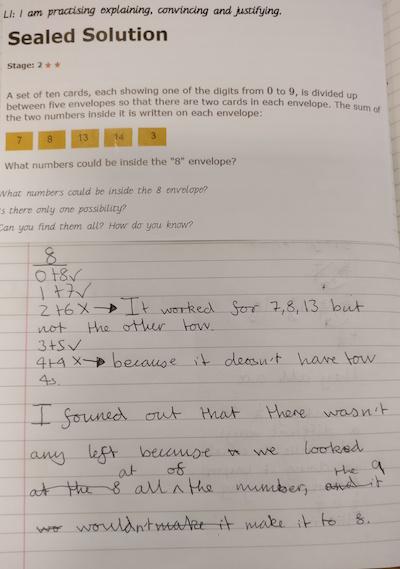
The following photos were taken as children shared out biscuits, inspired by the EYFS task Using Books: The Doorbell Rang:
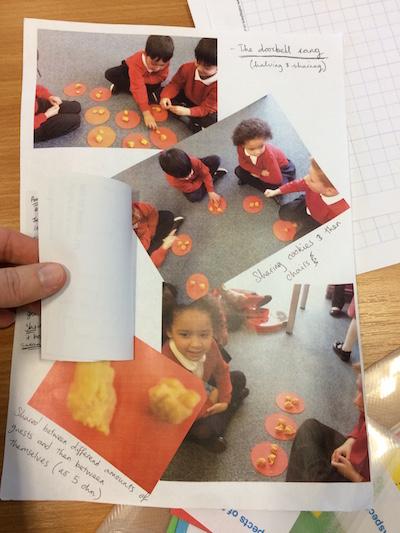
This is a photo of children's recording as they had a go at Play to 37:
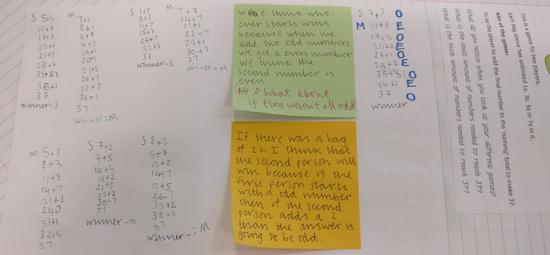
Here is a picture of one child's work on Rectangle Tangle:
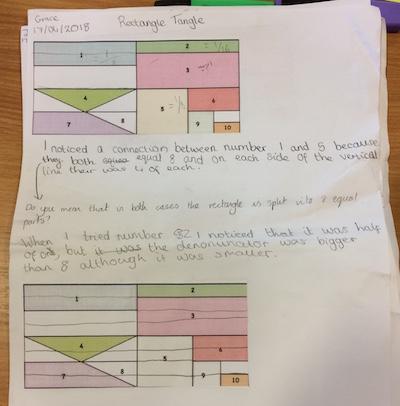
On tables, we discussed how the reasoning tasks had gone and how our developing assessment ideas had fared, then shared one positive outcome and one challenge with everyone. Here are the issues raised:
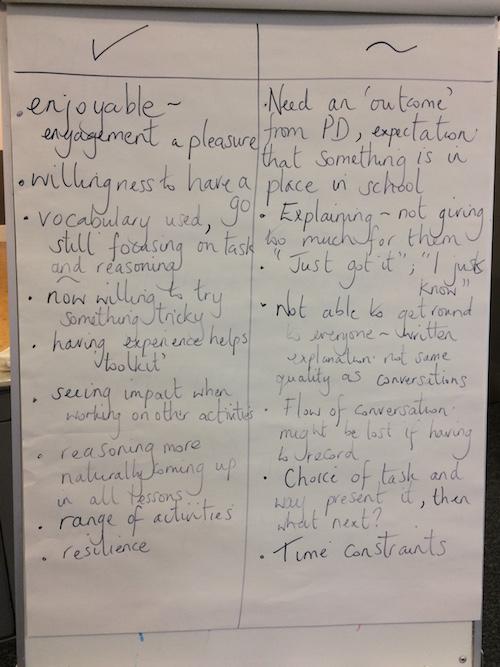
Please refer to the Teacher Takeaway slide in the pdf for a reminder of the gap tasks from Day 5 to prepare for Day 6.
Day 6: Wednesday 20 June 2018
Here is a pdf of the PowerPoint slides we used on the day: 20180620THDay6.pdf
The NRICH tasks were:
Area and Perimeter
Arranging Cubes
Making Rectangles
Eggs in Baskets
We watched videos of Reception children from Seven Mills Primary School having a go at the Poly Plug Rectangle task and we attempted to assess their problem solving, reasoning and fluency from the short clips. (Thank you to Tom for allowing us to use these.)
Each school gave a brief presentation sharing their learning journey over the project. Several key themes emerged, which are summarised in the above linked pdf of the slides used.
In the afternoon, we discussed the chapter on talk from Mike Askew's book 'Transforming Primary Mathematics' and had a go at several tasks working in groups with one or two colleagues being observers.
With the Eggs in Baskets task, we challenged ourselves to consider as many different ways of approaching the problem as possible and one group used a bar model:
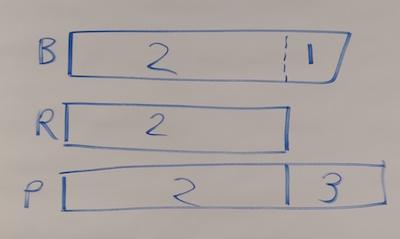
Initially, they drew just the brown (B) and red (R) bars with no numbers, knowing that there was one more egg in the brown basket than the red, hence B being one longer than R.
They knew that pink (P) had three more than R, so drew the longer bar for P, adding the '3'.
As they were told that there were ten eggs altogether, they knew that the three identical parts of the bars in total must represent 10-4=6 eggs, making each worth 2.
Fran and Liz would like to thank everyone who participated in the project for their enthusiasm, thoughtfulness and eagerness to learn. We would be very grateful for participants' feedback about this programme. Please do complete the survey and share your views, either as an individual or as a pair from the same school.
Each session will offer opportunities to explore the role of NRICH tasks in nurturing confident, resourceful and enthusiastic teachers and learners of mathematics, and gap tasks will encourage the development and embedding of these ideas in their schools throughout the year.
This page summarises the content and discussions during each day. If you would like anything uploading to this page, or have any queries about the project, please contact the NRICH primary team.
Day 1: Wednesday 04 October 2017
Here is a pdf of the PowerPoint slides we used on the day: 20171004TH Day 1.pdf
The tasks were:
First Product Sudoku
Four Triangles Puzzle
Magic Vs
Day 2: Wednesday 29th November 2017
Here is a pdf of the PowerPoint slides we used on the day: 20171129TH_Day 2.pdfThe tasks were:
Sandwiches
Which Scripts?
Reach 100
Day 3: Tuesday 9th January 2018
Here is a pdf of the PowerPoint slides we used on the day: 20180109 TH Day 3.pdf
The tasks were:
Reach 100
Which Scripts?
Maths Story Time
Poly Plug Rectangles
Day 4: Tuesday 6th March 2018
Here is a pdf of the PowerPoint slides we used on the day: 20180306THDay4.pdf
The tasks were:
Using Books: The Doorbell Rang
Rectangle Tangle
Robot Monsters
Sealed Solution
Square Subtraction
Odd Times Even
Guess the Dominoes
Play to 37
Here are photos of some children's reasoning, the first relates to Poly Plug Rectangles and the second to Fifteen Cards:
Image

Image

This photo shows a display all about Poly Plug Rectangles:
Image

Here are notes made about how one class got on with the task:
Image

The photos below show developing reasoning rubrics:
Image

Image

Image

Here is one example of rubric which takes into account the five stages of reasoning, with question prompts for adults and sentence starters for children:
Image

Please refer to the Teacher Takeaway slide in the PDF for a reminder of the gap tasks from Day 4 to prepare for Day 5.
Day 5: Wednesday 18 April 2018
Here is a pdf of the PowerPoint slides we used on the day: 20180418THDay5.pdf
The NRICH tasks were:
Number Match
Fraction Match
Factors and Multiples Game
Square Surprise and Seeing Squares
Estimating Angles
Board Block
Cops and Robbers
Guess the Houses
Here are downloadable sheets containing numberless protractors which Fran mentioned on the day: 180-degree.docx and 360-degree.docx
We also worked on some of the tasks featured in the article Fluency without Fear, available from youcubed.org.
We shared experiences of working on reasoning tasks since last time. Here are two photos showing Reception children working on the Robot Monsters task:
Image
Image
Below are two examples of children's recording as they worked on Heads and Feet:
Image

Image

Here are some children's work on the problem Sealed Solution:
Image

Image

The following photos were taken as children shared out biscuits, inspired by the EYFS task Using Books: The Doorbell Rang:
Image

This is a photo of children's recording as they had a go at Play to 37:
Image

Here is a picture of one child's work on Rectangle Tangle:
Image

On tables, we discussed how the reasoning tasks had gone and how our developing assessment ideas had fared, then shared one positive outcome and one challenge with everyone. Here are the issues raised:
Image

Please refer to the Teacher Takeaway slide in the pdf for a reminder of the gap tasks from Day 5 to prepare for Day 6.
Day 6: Wednesday 20 June 2018
Here is a pdf of the PowerPoint slides we used on the day: 20180620THDay6.pdf
The NRICH tasks were:
Area and Perimeter
Arranging Cubes
Making Rectangles
Eggs in Baskets
We watched videos of Reception children from Seven Mills Primary School having a go at the Poly Plug Rectangle task and we attempted to assess their problem solving, reasoning and fluency from the short clips. (Thank you to Tom for allowing us to use these.)
Each school gave a brief presentation sharing their learning journey over the project. Several key themes emerged, which are summarised in the above linked pdf of the slides used.
In the afternoon, we discussed the chapter on talk from Mike Askew's book 'Transforming Primary Mathematics' and had a go at several tasks working in groups with one or two colleagues being observers.
With the Eggs in Baskets task, we challenged ourselves to consider as many different ways of approaching the problem as possible and one group used a bar model:
Image

Initially, they drew just the brown (B) and red (R) bars with no numbers, knowing that there was one more egg in the brown basket than the red, hence B being one longer than R.
They knew that pink (P) had three more than R, so drew the longer bar for P, adding the '3'.
As they were told that there were ten eggs altogether, they knew that the three identical parts of the bars in total must represent 10-4=6 eggs, making each worth 2.
Fran and Liz would like to thank everyone who participated in the project for their enthusiasm, thoughtfulness and eagerness to learn. We would be very grateful for participants' feedback about this programme. Please do complete the survey and share your views, either as an individual or as a pair from the same school.
